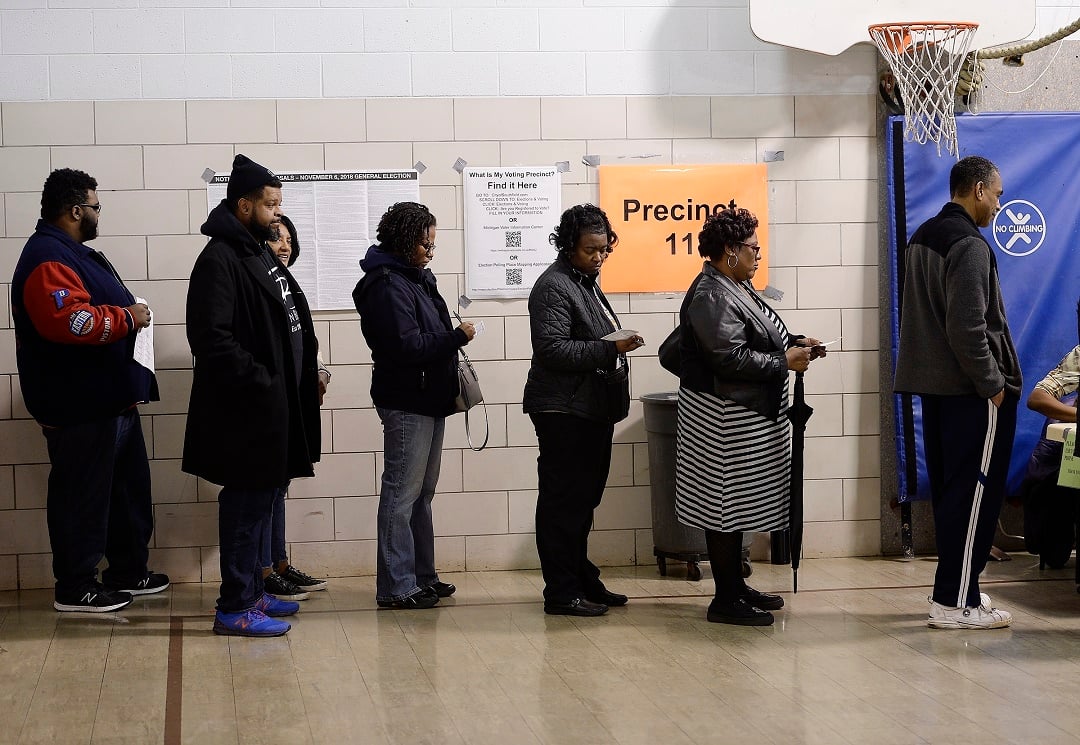CINCINNATI (CN) --- Michigan's ballot access laws for statewide offices impose a heavy burden on independent candidates and are unconstitutional, a Sixth Circuit panel ruled on Monday.
The decision, which comes three months after the case was argued before the Cincinnati-based appeals court, affirmed the ruling of a federal judge and upheld an injunction that reduced the amount of signatures needed for placement on a ballot.
Christopher Graveline wanted to run as an independent candidate for Michigan attorney general in 2018. At the time, that meant he was required to obtain the signatures of at least 30,000 voters and distribute "petition circulators" in half of the state's congressional districts.
Graveline failed in his efforts, and filed suit alongside several voters against Michigan Secretary of State Jocelyn Benson. The plaintiffs claimed the thresholds for ballot placement were barriers against independent candidates.
U.S. District Judge Victoria Roberts agreed and granted Graveline's motion for an injunction blocking the laws and reducing the signature requirement to 12,000.
In her opinion, Roberts, a Bill Clinton appointee, cited the fact that no independent candidate has appeared on a ballot for statewide office since the rules were implemented in 1988.
She said the restrictions "'operate to freeze the political status quo,' and effectively bar independent candidates from accessing the ballot."
U.S. Circuit Judge Karen Moore, also a Clinton appointee, wrote the Sixth Circuit's majority opinion Monday and rejected the state's argument that Graveline's decision not to run again mooted his case.
"In the case before us," she wrote, "not only are the laws at issue still valid and applicable to Graveline (and any other independent candidate who plans to run for statewide office), but also plaintiffs declared that they wish to vote for independent candidates for statewide offices in future elections. Clearly, the controversy is capable of repetition."
Moore shifted to the merits of Graveline's complaint, and agreed with his contention that Michigan's restrictions -- including a signature deadline that comes before major parties have selected their candidates -- impose an unconstitutional burden.
"All told, Michigan's system works to disadvantage independent candidates alone by requiring them to seek a significant number of signatures from an electorate that is not yet politically energized and to stake out positions in a race with yet undecided contours," she wrote. "Thus, we break no new ground in concluding that the combination of the 30,000-signature requirement, the geographic-distribution requirement, and the filing deadline imposes a severe burden on independent candidates."
The judge cited the evidence in the record, including the complete dearth of independent candidates on statewide ballots, as proof the laws impose a severe burden and effectively allow Democrats and Republicans to "monopolize elections."
The state argued that Graveline's failure to promptly begin his signature collection efforts was the main reason he failed to amass the required 30,000 signatures, but Moore disagreed.
"The evidence shows that an unaffiliated candidate has never been on the Michigan ballot, even though defendants' records show that several candidates formed their campaign committees well in advance of the filing deadline," the ruling states.
On appeal, the state also challenged the lower court's decision to unilaterally reduce the signature requirement from 30,000 to 12,000, but Moore rejected the argument and called the court's relief a "workable interim provision."
Moore was joined in the majority by Senior U.S. Circuit Judge Ronald Gilman, another Clinton appointee.
Attorney Oliver Hall, founder of the Center for Competitive Democracy and attorney for Graveline, applauded the panel’s decision in a statement Monday.
“It is carefully reasoned and well-grounded in the facts and law,” Hall said. “And it properly recognizes that 30 years is too long for independents to be frozen out of Michigan’s electoral process. This decision is a victory not only for our clients, Christopher Graveline and his supporters, but also for all Michigan voters, who deserve a free and meaningful choice at the polls.”
U.S. Circuit Judge Richard Griffin wrote a dissenting opinion in which he criticized the majority for its reliance on the historical evidence that no independent candidate has appeared on a statewide ballot since 1988.
Griffin, an appointee of George W. Bush, reminded his colleagues that "historical evidence is 'not conclusive in and of itself,'" and accused them of leaving a "gaping evidentiary hole" in their decision.
He cited evidence from the state's expert witness that gathering 30,000 signatures in the required 180-day period "can most certainly be done," and said that "history alone is not enough" to establish that certain burdens are unconstitutional.
Griffin also disputed the notion that earlier deadlines for independent candidates should be considered disparate treatment.
"One could argue Michigan's electorate was already politically motivated during the period in which Graveline was collecting signatures to run as an independent candidate," the dissent states. "By July 2018, Michigan voters had already signed enough petitions to place one legislative initiative and two constitutional amendments on the ballot. All three involved hundreds of thousands of signatures."
Michigan Attorney General Dana Nessel's office declined to comment, other than to say it is reviewing the decision.
Subscribe to Closing Arguments
Sign up for new weekly newsletter Closing Arguments to get the latest about ongoing trials, major litigation and hot cases and rulings in courthouses around the U.S. and the world.









